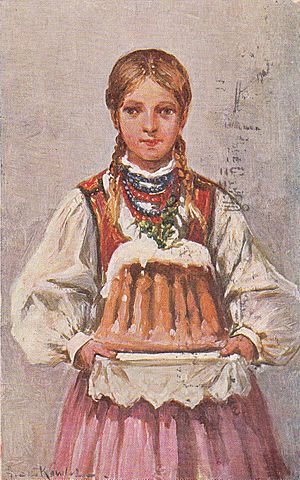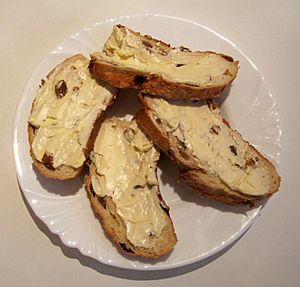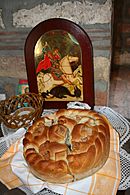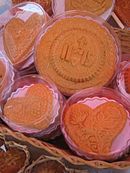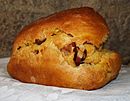Easter bread facts for kids
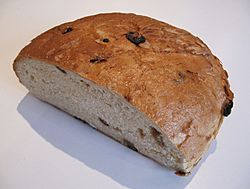
German Osterbrot with raisins and almonds
|
|
| Type | Bread |
|---|---|
| Other information | Prepared for Easter |
Easter bread is a special kind of bread baked in many European countries during the Easter holidays. People have been making and eating sweet or "communion" bread for Easter for a very long time. This tradition started in a place called Byzantium, which was part of the Orthodox Christian church. Some stories even suggest that recipes for sweet, honey-flavored bread might be as old as ancient Greece! The Romans also loved sweet bread desserts, similar to the famous panettone we know today.
Contents
Easter Breads in Eastern Europe
Many countries in Eastern Europe have their own unique Easter breads. These breads are often sweet and decorated in special ways.
Kozunak, Kulich, and Paska
In Bulgaria, people enjoy a traditional Easter bread called Kozunak. Over in Russia, one of the most popular Easter breads is kulich. It's a tall, cylindrical bread, often decorated with white icing.
Ukraine also has its own Easter breads, usually called paska. These are often rich, white breads. They are decorated with symbols like crosses, flowers, braids, or wheat. These designs represent important parts of the Orthodox and Eastern Catholic faiths.
In Romania and Moldova, a special Easter pastry is called Pască. The word Pasca actually means "Easter" in the Eastern Orthodox faith. This Romanian Pască is made with cheese. Sometimes, it also has fruits, nuts, or chocolate for decoration. Romanians also make another sweet bread for Easter and Christmas called Cozonac.
Baba
Baba or babka is another Easter bread found in Ukraine, Poland, and Belarus. It's different from paska because it's usually tall and round, often baked in a special bundt-shaped pan. Babka often contains raisins, succade, or candied orange peel. It might even have icing on top! This bread is much sweeter than paska. Like paska, babka is usually made only for Easter Sunday to celebrate.
Syrnyk
Syrnyk is a type of quick bread that tastes a bit like cheesecake. In Russian Orthodox culture, Syrnyk is often put into Easter food baskets. These baskets are taken to church to be blessed on Easter. They might also contain ham, sausages, cheeses, and other foods that people avoided during the period of Lent. The dough for Syrnyk is made with eggs, butter, cottage cheese, cream cheese, honey, walnuts, almonds, and cinnamon.
German Easter Bread
In Germany, a special Easter bread called Osterbrot is sold in the weeks before Easter. This bread is made with yeast dough, raisins, and almond splinters. People usually slice it and spread butter on it. It's often enjoyed for breakfast or during tea time, which Germans call Kaffee und Kuchen (coffee and cake).
Dutch Easter Bread
The Dutch Easter bread is called 'stol'. It's a fruit bread with raisins and usually has a filling of almond paste. Interestingly, this is the same kind of bread that is also eaten during Christmas in the Netherlands.
Italian Easter Breads
Italy has several unique Easter bread traditions, especially in different regions.
Central Italy's Pizza di Pasqua
Pizza di Pasqua means "Easter Pizza" in English, but it's not like the pizza you might think of! It's a savory cake that rises with yeast. It's popular in some parts of central Italy. This cake is made with wheat flour, eggs, pecorino cheese, and parmesan cheese.
Traditionally, people eat pizza di Pasqua for breakfast on Easter morning. It can also be served as a starter during Easter lunch, often with blessed boiled eggs, ciauscolo (a type of sausage), and red wine. It's also a popular food for Easter Monday picnics. This cheesy pizza di Pasqua looks like a panettone. It's a traditional food from the Marche region and also Umbria.
There's also a sweet version of pizza di Pasqua. This one can have candied fruits or not, and it's topped with a meringue glaze and sugar beads.
According to religious tradition, pizza di Pasqua should be prepared on Maundy Thursday or Good Friday. It's then eaten only on Easter, after the period of fasting during Lent ends. Once it was ready, people used to take their pizza di Pasqua to church to be blessed along with other foods for Easter day.
Sardinia's Symbolic Breads
In Sardinia, Italy, bread is very important in daily life and for special occasions. It's a symbol of life itself. There's an old saying that means, "one who has bread never dies."
For Easter, bread becomes even more symbolic. For example, some Easter breads are shaped like a cross to represent the crucifixion of Jesus Christ. Other breads might be baked to go around an egg, and have the letters BP on them. These letters stand for buona Pasqua, which means "happy Easter." These letters show that the bread carries a special message of celebration.
Types of Easter Bread
| Image | Name | Native name | Cuisine | Reference |
|---|---|---|---|---|
| Paska | Паска Paska პასკა |
Ukrainian Belarusian Slovak Georgian |
||
| Kulich | Кулич | Russian | ||
| Cozonac | Козунак | Bulgarian Macedonian Romanian Moldovan |
||
| Pasca | Pască | Romanian Moldovan |
||
| Babka | Baba wielkanocna | Polish | ||
| Kalach | Колач Fonott kalács |
Serbian Hungarian |
||
| Pinca | Pinca | Croatian Montenegrin |
||
| Easter breads | Velikonocni kruhki | Slovenian | ||
| Tsoureki also called paskalya çöreği |
τσουρέκι չորեկ |
Greek Armenian |
||
| Hot cross bun | British | |||
| Mazanec | Mazanec | Czech | ||
| Paasstol | Paasstol | Dutch | ||
| Easter Dove | Colomba di Pasqua | Italian | ||
| Pizza di Pasqua | Pizza di Pasqua | Italian | ||
| Pizza di Pasqua (sweet variant) | Pizza di Pasqua (sweet variant) | Italian | ||
| Folar | Folar de Páscoa | Portuguese | ||
| Hornazo | Hornazo | Spanish | ||
| Easter Bread | Osterbrot | German |
 | Audre Lorde |
 | John Berry Meachum |
 | Ferdinand Lee Barnett |


